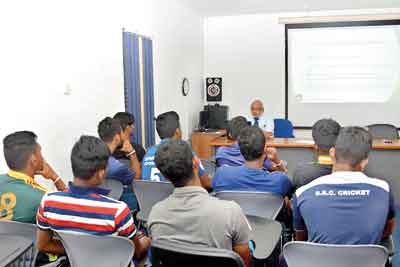SLADA to educate Lankan schoolchildren on banned substances and WADA

Dr. Seevali Jayawickrama conducting an orientation programme for cricketers
The Education Ministry’s sports special consultant has criticised the country’s anti-doping authorities for not paying enough attention to the use of banned substances by school level athletes, a matter that figured in Finance Minister Mangala Samaraweera’s budget speech on Thursday.
But a senior official of Sri Lanka Anti-Doping Agency said they were taking steps to take the message to the schools.
There are insidious repercussions with the increase of banned substances available in the schools arena, but yet, there are no meaningful steps taken by SLADA or WADA (World Anti-Doping Agency) to educate and take control of the situation, according to the Education Ministry’s Special Sports Consultant Sunil Jayaweera.
He told the Sunday Times, “Generally, a drug test on a sportsman costs around US$ 250 and certainly, we cannot afford it. But, does that mean the menace is not prevalent and it is not a problem.”
Jayaweera was of the view that, though the people do not come across stories on the use of banned substances among schoolchildren, they are aware that the problem is at hand and the only difference being, it is not detected. “First, the SLADA should take note that athletes at school level are easy prey to this menace, but so far nothing has been done.”
“First, the young athletes have not been educated about the repercussions of drug use and, at the same time, these substances are freely available at every nook and cranny. So, it is easy for interested parties to influence schoolchildren into partaking in this habit. Then, invariably, these athletes become dependent on these substances, and then they graduate to national level. It is only at this juncture that SLADA and WADA get activated”.
Jayaweera also pointed out they are aware that the use is rampant, especially in rugby. “We are aware of the situation, but due to various constraints we are not in a position to step in and take action. The answer to this is SLADA should step in and begin a dialogue with the 5,000-odd athletes in the country and conduct random tests. Then the result will be two-pronged. Then the athletes concerned would get to know what these substances really are and the consequences of their use. The other will be that, once the authorities begin to conduct random tests, the athletes would think twice before indulging in their use.”
However, SLADA Chairman Dr Seevali Jayawickrama thinks otherwise. He says his institution is working closely with the schools’ sports fraternity. He said, “Every year we get together with Singer Sri Lanka, which is sponsoring the schools rugby and workout a programme with them. Besides, we also work with groups of Physical Training Instructors (PTIs) in the schools arena and educate them on the subject. However, we certainly are not in a position to visit all the schools in the country. But, if anyone makes a request, we certainly would try to heed to it.”
Dr. Jayawickrema also revealed they are introducing the subject into the school’s system and are working closely with the National Institute of Education, to try and include it as a subject from Grade 6 to 9. However, the Education authorities point out it could not be done immediately.
Nonetheless, observers point out the use of banned substances has become a problem in the country and the biggest obstacle is the absence of proper legal avenues to curb the menace.


